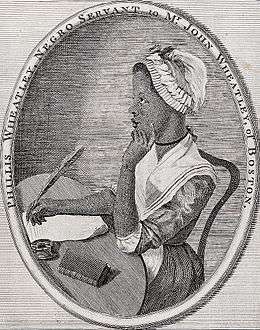Scipio Moorhead

Scipio Moorhead (active c. 1773) was an enslaved African-American artist who lived in Boston, Massachusetts. His only surviving work is a portrait of the African-American poet Phillis Wheatley. Moorhead gained recognition through Phillis Wheatley's inscription "To S. M. a young African Painter, on seeing his Works", published in Poems on Various Subjects, Religious and Moral, 1773.
Moorhead was a slave of the Reverend John Moorhead of Boston, Massachusetts.[1] His talents for drawing were tutored by the Reverend's wife Sarah Moorhead, who was an art teacher.[2] Although a slave, Scipio Moorhead enjoyed the usual rights of free workers. It is possible that the copperplate engraving of Phillis Wheatley that adorns much of her published poetry is his creation.[3] No original work by Scipio has survived, but he may be the person referred to the a Boston News-Letter advertisement on January 7, 1773, which spoke of a negro artist... A negro of extraordinary genius.[4]
See also
Further reading
- Slauter, Eric. Looking for Scipio Moorhead : an "African painter" in revolutionary North America in Lugo-Ortiz, Agnes (2013). Slave portraiture in the Atlantic world. Cambridge: Cambridge University Press. ISBN 9781107004399. p. 89-116
References
- ↑ Scipio Moorhead in Bénézit
- ↑ Appiah, Kwame A.; Gates Jr., Henry L. (1999). Africana: The Encyclopedia of the African and African American Experience. U.S: Basic Civitas Books. p. 1332(?). ISBN 0-465-00071-1.
- ↑ Patton, Sharon F. (1998). Oxford History of Art: African- American Art. Oxford, New York: Oxford University press. p. 12. ISBN 0-19284213-7.
- ↑ Lewis, R.W.B. and Nacy (1999). American Characters. Yale University: Yale University. p. 380. ISBN 0-300-07895-1.